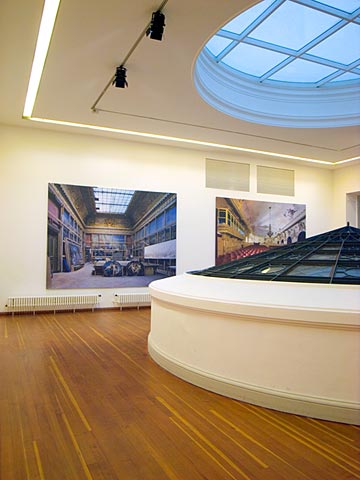Day One
I flew into Tegel airport, a hopelessly outmoded airport left over from the Cold War days, rented my car, and met up with my friend Anamarie at her house in Zehlendorf. It rained heavily all afternoon, so we went to the Martin-Gropius-Bau (museum) to see the Robert Polidori show. I have long admired Polidori’s architectural photography and have two of his books. There is a strong formal rigor to his compositions, which anchors the lush colors of old Havana or the acidy greens and purples of abandoned Chernobyl. This was the first time I’d seen his large prints–size being the rage these days–but appropriate, perhaps, for his work. The prints appeared to be conventional c-prints mounted on plexi or some other backing and then floated inside a frame. It is clear that the prints were made from digital scans, the tonal range often a bit unbelievable–shadows too open, highlights too closed, colors too saturated, separate surfaces too well delineated. Sometimes it gave his images a Vermeer-like photo-realism, which was enhanced in the Versailles pictures by the side light and glimpses of other rooms through doorways. But was this quality intentional? Would the prints have worked just as well with a lighter hand in Photoshop?

Polidori at the Martin-Gropius-Bau, large digital prints
The Martin-Gropius-Bau spaces were haphazardly lit, and I fought reflections constantly, but the older architecture of the galleries suited the images fine. I could have used fewer prints, however, and wish the exhibit had stayed exclusively with the Havana, Chernobyl, and Versailles images. Two extremely large images, digitally rendered more coarsely than the others, were completely unnecessary and should have been left out. I enjoyed the exhibit, despite the above complaints, but I prefer Polidori’s books and seeing his color spreads leap out of the black and white print of the New Yorker magazine.